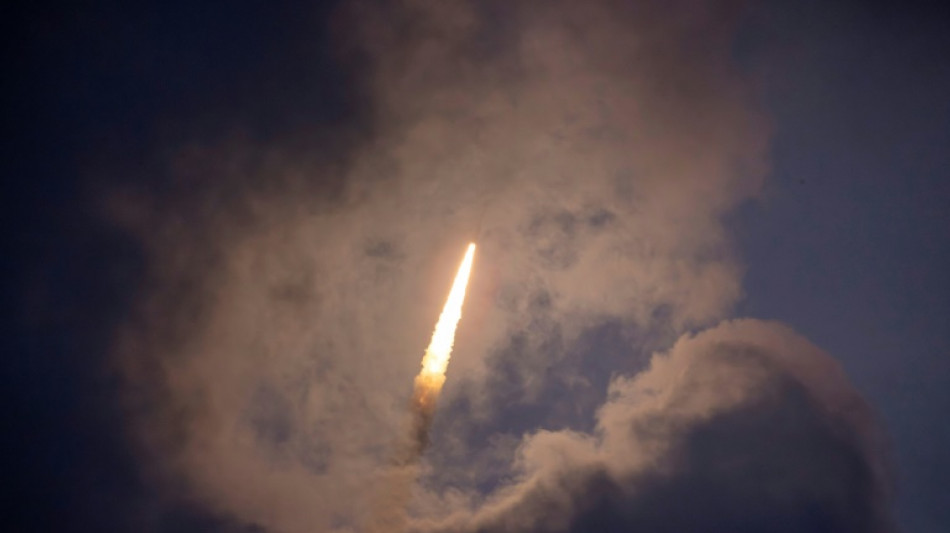
-
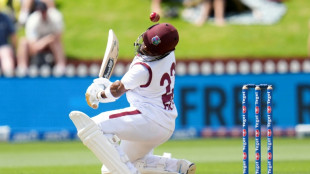 Hodge edges towards century as West Indies 310-4, trail by 265
Hodge edges towards century as West Indies 310-4, trail by 265
-
US Afghans in limbo after Washington soldier attack
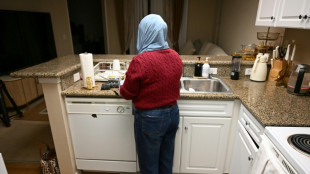
-
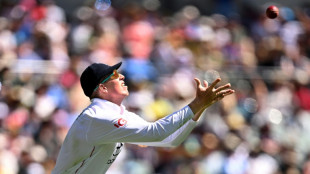 England lose Duckett in chase of record 435 to keep Ashes alive
England lose Duckett in chase of record 435 to keep Ashes alive
-
Australia all out for 349, set England 435 to win 3rd Ashes Test
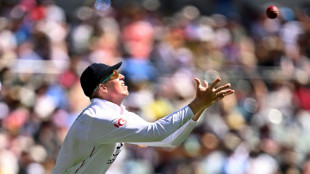
-
 US strikes over 70 IS targets in Syria after attack on troops
US strikes over 70 IS targets in Syria after attack on troops
-
Australian lifeguards fall silent for Bondi Beach victims

-
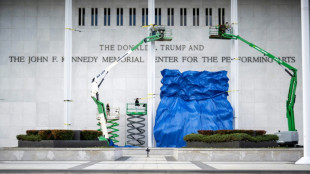 Trump's name added to Kennedy Center facade, a day after change
Trump's name added to Kennedy Center facade, a day after change
-
West Indies 206-2, trail by 369, after Duffy's double strike

-
 US strikes Islamic State group in Syria after deadly attack on troops
US strikes Islamic State group in Syria after deadly attack on troops
-
Epstein files opened: famous faces, many blacked-out pages
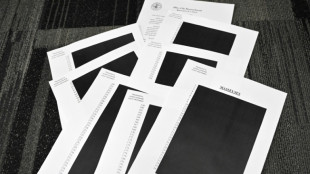
-
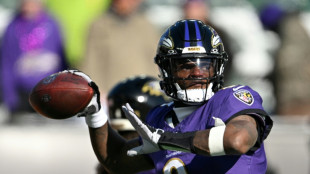 Ravens face 'special' Patriots clash as playoffs come into focus
Ravens face 'special' Patriots clash as playoffs come into focus
-
Newly released Epstein files: what we know

-
 Musk wins US court appeal of $56 bn Tesla pay package
Musk wins US court appeal of $56 bn Tesla pay package
-
US judge voids murder conviction in Jam Master Jay killing

-
 Trump doesn't rule out war with Venezuela
Trump doesn't rule out war with Venezuela
-
Haller, Aouar out of AFCON, Zambia coach drama

-
 Nasdaq rallies again while yen falls despite BOJ rate hike
Nasdaq rallies again while yen falls despite BOJ rate hike
-
Bologna win shoot-out with Inter to reach Italian Super Cup final

-
 Brandt and Beier send Dortmund second in Bundesliga
Brandt and Beier send Dortmund second in Bundesliga
-
Trump administration begins release of Epstein files

-
 UN Security Council votes to extend DR Congo mission by one year
UN Security Council votes to extend DR Congo mission by one year
-
Family of Angels pitcher, club settle case over 2019 death

-
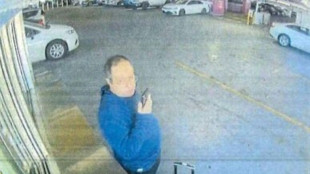 US university killer's mystery motive sought after suicide
US university killer's mystery motive sought after suicide
-
Rubio says won't force deal on Ukraine as Europeans join Miami talks

-
 Burkinabe teen behind viral French 'coup' video has no regrets
Burkinabe teen behind viral French 'coup' video has no regrets
-
Brazil court rejects new Bolsonaro appeal against coup conviction

-
 Three-time Grand Slam winner Wawrinka to retire in 2026
Three-time Grand Slam winner Wawrinka to retire in 2026
-
Man Utd can fight for Premier League title in next few years: Amorim

-
 Pandya blitz powers India to T20 series win over South Africa
Pandya blitz powers India to T20 series win over South Africa
-
Misinformation complicated Brown University shooting probe: police

-
 IMF approves $206 mn aid to Sri Lanka after Cyclone Ditwah
IMF approves $206 mn aid to Sri Lanka after Cyclone Ditwah
-
Stocks advance as markets cheer weak inflation

-
 Emery says rising expectations driving red-hot Villa
Emery says rising expectations driving red-hot Villa
-
Three killed in Taipei metro attacks, suspect dead

-
 Seven Colombian soldiers killed in guerrilla attack: army
Seven Colombian soldiers killed in guerrilla attack: army
-
Amorim takes aim at Man Utd youth stars over 'entitlement'

-
 Mercosur meets in Brazil, EU eyes January 12 trade deal
Mercosur meets in Brazil, EU eyes January 12 trade deal
-
US Fed official says no urgency to cut rates, flags distorted data

-
 Rome to charge visitors for access to Trevi Fountain
Rome to charge visitors for access to Trevi Fountain
-
Spurs 'not a quick fix' for under-fire Frank

-
 Poland president accuses Ukraine of not appreciating war support
Poland president accuses Ukraine of not appreciating war support
-
Stocks advance with focus on central banks, tech

-
 Amorim unfazed by 'Free Mainoo' T-shirt ahead of Villa clash
Amorim unfazed by 'Free Mainoo' T-shirt ahead of Villa clash
-
PSG penalty hero Safonov ended Intercontinental win with broken hand

-
 French court rejects Shein suspension
French court rejects Shein suspension
-
'It's so much fun,' says Vonn as she milks her comeback

-
 Moscow intent on pressing on in Ukraine: Putin
Moscow intent on pressing on in Ukraine: Putin
-
UN declares famine over in Gaza, says 'situation remains critical'

-
 Guardiola 'excited' by Man City future, not pondering exit
Guardiola 'excited' by Man City future, not pondering exit
-
Czechs name veteran coach Koubek for World Cup play-offs


Debris falling from the sky: more often, more risk
It is still not clear what exactly fell onto a Kenyan village last month, but such events are likely to become increasingly common given the amount of space debris drifting above the planet.
- What we know
A metallic ring of roughly 2.5 metres (8 feet) in diameter and weighing some 500 kilogrammes (1,100 pounds), crashed into Mukuku village, in Makueni county, in the south of the country on December 30.
The Kenya Space Agency (KSA) has opened an investigation and is examining the possibility that it might have been the separation ring from a rocket.
Other theories have already surfaced however, and a KSA spokesman has said they have not ruled out anything.
- The theories being examined
It is not even certain that what crashed in Kenya came from outer space.
But for Romain Lucken who runs Aldoria, a French start-up that tracks debris in space, it is "absolutely plausible" that it did.
He said he thought it might be part of the upper stage of a Polar Satellite Launch Vehicle (PSLV) developed by India's space agency.
"There is a mission that was sent up on December 30 with a return date that fits well, and most of all, a point of re-entry that fits very well, to within a few dozen kilometres," he told AFP.
Aldoria, which has 15 telescopes around the world, searches for information on launches and then works out flight paths based on "the typical trajectories of each of the main launch sites".
But Jonathan McDowell, an astronomer at the Harvard-Smithsonian Center for Astrophysics, is not convinced.
It was McDowell who identified a piece of the International Space Station (ISS) that crashed down on a house in Florida last April.
"I do not believe this object came from space. Maybe fell off an airplane," he told AFP. "Give me evidence it is space debris."
He has not however entirely ruled out that it is part of an Ariane 5 V184 launch in 2008 that finally returned to earth.
But the French aerospace group told AFP: "This piece does not belong to an element from a European launcher operated by Arianespace."
John Crassidis at New York's SUNY, which works with NASA on space debris, endorsed the assessment released by the Kenya Space Agency.
"I think their technical assessments are 100 percent accurate, and they're going to figure out what country it came from, because every country does things a little bit differently," he said.
While it could be a separation ring from a rocket, as the KSA was considering, it might also have come from the upper stage of a rocket. "Those tend to be smaller," he told AFP.
Christophe Bonnal, a French specialist in space debris, said the debris might have come from a military launcher.
"They are armoured, which fits with the fact that it is very big and heavy," he said. But then it could also have come from a digger or a tank, he added.
- Assessing the risk
So far, at least, such incidents have not caused any deaths, but since the number of space launches is rising, so too are the risks.
"Ten years ago, an object that might create impact fragments re-entered the atmosphere every two weeks," said Stijn Lemmens, a specialist in debris at the European Space Agency (ESA). "Now, that can happen twice a week."
For Lucken, at Aldoria, it is just a question of time.
"It's going to end up falling on critical infrastructure, like a nuclear power station, an oil tanker or homes," he warned.
"It's our Sword of Damocles," said Christophe Bonnal, referring to the parable of the sword suspended by a thread over a ruler's head.
But geography plays in our favour, he added, given that 71 percent of the planet is covered by ocean and 10 percent by deserts. Only 3.3 percent of Earth is densely populated, he said.
So far, said Lucken, about 30,000 pieces of debris measuring more than 10 centimetres have been identified orbiting the earth, and more than a million larger than one centimetre.
All of them were potentially dangerous, he added.
And that catalogue is not an exhaustive list, Bonnal pointed out, since it does not include various military objects launched into space.
"If it's a piece of a US missile, we'll probably never know," he said.
In Europe, said Lucken, there are rules obliging operators to ensure controlled re-entries in uninhabited zones, such as in the South Pacific -- or to be sure such objects would be completely destroyed.
"But that's the theory. Once the mission is launched, anything can happen."
And no one is going to be chasing them to pay out compensation if something goes wrong, he added.
And, as another observer noted, part of the problem lies elsewhere.
China is by far the worst offender, said Crassidis.
"We have these rules, but China and Russia don't really follow any rules."
burs-tsz-agu-tq-neo/jj/gv
Y.Aukaiv--AMWN